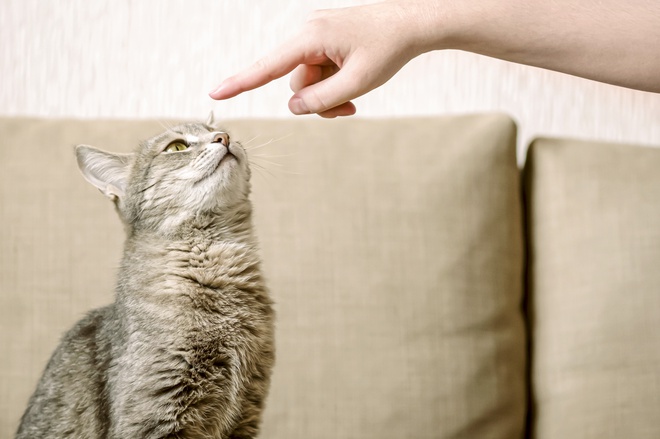Why train a cat or a dog?
We often underestimate the importance of training your pet, whether it is a cat or a dog. But it is essential to do so! Find out in this article why you should train your pets as well as all the benefits.

Reading time : 5 min
You might ask yourself: why should I bother training my dog or cat? Having an adorable cat or dog is great, but it can quickly turn sour when your angel starts scratching your furniture, peeing inside and barking at others. In this article, we will talk about the benefits of training your cat or dog, as well as how to build a healthy relationship with your pet.
TOPICS
Why should you train your dog?

We all know the saying: “a dog is a man’s best friend”. But your relationship can quickly turn sour if your dog is not trained, runs after stray cats, and barks at other dogs.
The consequences of not training your dog
You can probably imagine a walk with your pooch turning into your worst nightmare: your dog is running away, sniffing everyone, fighting with all the other dogs, chasing neighbourhood cats and barking.
This could lead you to want to shorten your dog’s walks, which can then make your dog frustrated and want to run away. Shortening your dog’s outings can also affect their cleanliness.
This is bad for your dog's health, your nerves and therefore your relationship. Not to mention the fact that a dog that does not get enough outings will most likely become a runaway dog, with all the worries and consequences that entails.
Like any member of your family, your dog will need rules and boundaries. Dog training also means giving them reassuring reference points and signals, essentials to their psychological health.
The importance of socialisation in puppies
If you have adopted a puppy that is grumpy, frightened, and even angry, it is not normal and might be a sign that the puppy was taken too early from their mother. One to two weeks can make a big difference to a puppy, so it is recommended that the puppy stays with their mother until about 8 to 10 weeks.
At that age, puppies can eat solid food by themselves, are mobile and are aware of the world and humans around them. They are not frightened and have discovered new scents, sounds and sights.
Once the puppy has arrived in their new forever home, it is the owner’s job to continue the training of the puppy.
Four reasons to train your dog
Dogs are people pleasers and will quickly recognise their owner as the leader of the pack and become submissive. It is important to train your dog to implement a structure that will lead to a healthy relationship between the handler and the dog.
Potty training
Living with a dog that is not potty-trained can quickly become unbearable for the owners. When house training your dog, you should take them out frequently, at least every two hours and after each meal, otherwise they will relieve themselves in your house.
Protecting your dog against outside dangers.
A dog that is not trained to callbacks is susceptible to running away. Once lost, your dog can be disoriented, hurt themselves or cause accidents.
Showing your love
Training a dog means countless hours of undivided attention which will make your dog feel loved. A dog that destroys everything can be a sign of separation-anxiety or boredom. Training your dog can have a soothing and reassuring effect.
Guaranteeing a peaceful social life
A dog that jumps on everyone, sniffs, bites or scratches is not suitable for maintaining a social life.
Which method to use?
Regardless, training a dog should be based on positive reinforcement. In other words, the dog should be pet regularly and rewarded with treats. It will then associate their action with a positive situation (rewarding system) and will instinctively want to do it again.
On the other hand, if the dog misbehaves, you should never use force or violence. It is not the dog that should be corrected but the dog's behaviour.
10 questions to test your pet training knowledge
Do you know everything there is to know about training dogs and cats? Answer our 10 questions to find out!
Why should you train your cat?

Why do cats disappear? Can a cat ever get lost? Can I train my cat? Those are legitimate questions that a lot of owners ask themselves and training a cat is recommended to live a harmonious life with your pet.
The importance of socialisation
Just like dogs, kittens that have been taken away from their mother too early can present signs of aggression and uncleanliness. When a kitten is taken away too young, they have not had enough time to be socialised.
As a result, they will not have learned to behave like a cat, will not be clean, and may develop behavioural problems that are often characterised by aggression towards other cats and humans, including during playtime.
Cats that did not spend enough time with their mothers as kittens have difficulties controlling their bites and scratches and often prove to be hyperactive. Socialisation is an essential period in the cat's education, so much so that without this stage nothing seems possible.
And this is true even if the kitten has been bottle-fed. Learning from the mother is essential, otherwise they will develop inappropriate behaviour.
Training a runaway cat
Contrary to popular believes, it is totally possible to train a cat. However, it is important that the cat has been fully socialised as a kitten so they will be more receptive to training in their adult life.
Recall training
Why do cats run away? Cats love to explore and expand their territory as much as possible. When going for ambles, cats love to play, hunt, discover, take naps… It can happen that your cat is having too much fun outside and forgets to come home. Therefore, it is important to train your cat to recall to avoid any unnecessary anxieties.
It is different if you live in a flat, but if you live in a house, it might be a good idea to train your cat to recall. This is a way of protecting your cat but also of avoiding worries when they are late in returning.
Taking advantage from food
Another way to train your cat to come home is to simply not feed them before letting them out. A hungry cat will return home much more easily if they know that a bowl of kibble is waiting for them at home.
Using positive reinforcement
Furthermore, as cats are territorial animals, they need to feel comfortable in the place where they have chosen to live. While positive reinforcement works very well with cats, violence and brutality are not an option at all.
It is important to remember that under no circumstances should the cat be mistreated or coerced during training, otherwise they will decide to leave your home.
Conclusion
If you are having some difficulty getting your dog or cat to comply, you may feel discouraged. It is then possible to call on a cat or dog trainer to help you train your pet. Perhaps your dog or cat has been poorly socialised? They will therefore be more reluctant or less able to submit, comply or have the right behaviour. But nothing is lost! If they have developed bad habits, you can also get help from a dog or cat behaviourist. They will be able to give you the keys to help you educate your pets.
If educating a dog or a cat requires patience, kindness, and perseverance, remember that it is always easier to educate a pet than to correct bad habits. After all, the behaviour of your dog or cat depends above all on the education they have received.
Continue reading our guide
This article is a part of a complete guide on the subject. Do not miss the next chapters.
Do you know everything there is to know about training pets?
Answer our 10 questions to test your pet training knowledge.
